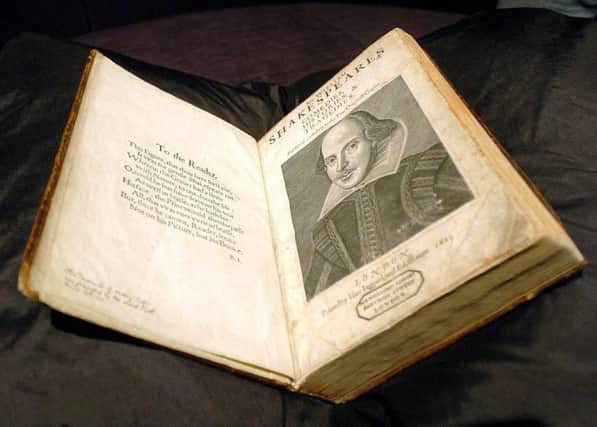NOSTALGIA: Eastbourne couple unravel history of The Bard


The book argues that the plays in this publication were brought together because of their significance for the Sidney-Herbert family, patrons of poets and playwrights over many generations.
Pauline Black, researcher and co-author said, “A key point here is that these plays were produced for Elizabethan and Jacobean court entertainment not the popular stage. These thought-provoking dramas were written for the intelligentsia by well-educated writers – certainly not by the attributed author, Shakespeare.”
Advertisement
Hide AdAdvertisement
Hide AdThe book launch coincides with Shakespeare’s Anniversary (April 23) throwing new light on a highly contentious issue subject.
The tome looks into the reasons which prompted the concealed authorship, principally the fear of Spanish domination at the time because of the impending royal marriage of Crown Prince Charles and a Spanish Princess.
That outcome, say the couple, could incur severe repression of English freedom of expression.
Pauline said, “The Protestant aristocracy, led by William Herbert, 3rd Earl of Pembroke, were determined to preserve their literary and historical heritage. This included the Tudor royal legitimacy dramatised in the English history plays. The deceased Shakespeare was chosen to avoid potential punishment of writers and editors (a duty of patrons) since he was beyond retribution for heresy or unorthodox writing by a tyrannical power.”
Advertisement
Hide AdAdvertisement
Hide AdShakespeare Unravelled presents a detailed portrait of Shakespeare and the period. His parents were illiterate, so were his children. The Bard had limited local schooling and no higher education.
Yet the acclaimed author, a tradesman’s son, wrote almost entirely about royalty and the courts of Europe while displaying detailed knowledge of aristocratic life and the law.
Without visiting Italy he was aware of the country’s history, geography and language. Shakespeare’s comprehension of classical texts is another mystery. For centuries there have been doubts about the authorship of the First Folio.
Alongside the profile of Shakespeare, play-broker and money lender, the book throws a new spotlight upon popular theatre and its great contrast with entertainment for the court.
Advertisement
Hide AdAdvertisement
Hide AdPauline and Michael Black retired to Eastbourne from London over a decade ago and have spent much time researching the Shakespeare authorship question. Pauline is a painter and was a graphic designer by profession while Michael’s career embraced marketing communications.
The book has been given an endorsement by Eastbourne’s Professor John Pick, who said, “This meticulously researched and highly readable book makes the truly astonishing claim that the well known life and career of Shakespeare - poet, playwright and Swan of Avon - was largely invented after his death.
“The book convincingly demonstrates the real authors of the 1623 First Folio used the dead Shakespeare’s name to shield themselves from the barbaric censorship of the time. Until then, even in his home town, Shakespeare had been honoured as a businessman who invested in the theatre and occasionally acted.
“The book puts a huge spanner in the well-known and romanticised story of Shakespeare and all his works. It will be widely read throughout the English-speaking world - and traditionalists should be warned, it is not easy to refute.”
The book is available on Amazon and in selected bookshops.
Advertisement
Hide AdAdvertisement
Hide AdDon’t miss out on all the latest breaking news where you live.
Here are four ways you can be sure you’ll be amongst the first to know what’s going on.
1 Make our website your homepage at www.eastbourneherald.co.uk
2 Like our Facebook page at www.facebook.com/eastbourne.herald
3 Follow us on Twitter @Eastbournenews
Advertisement
Hide AdAdvertisement
Hide Ad4 Register with us by clicking on ‘sign in’ (top right corner). You can then receive our daily newsletter AND add your point of view to stories that you read here.
And do share with your family and friends - so they don’t miss out!
The Eastbourne Herald - always the first with your local news.
Be part of it.